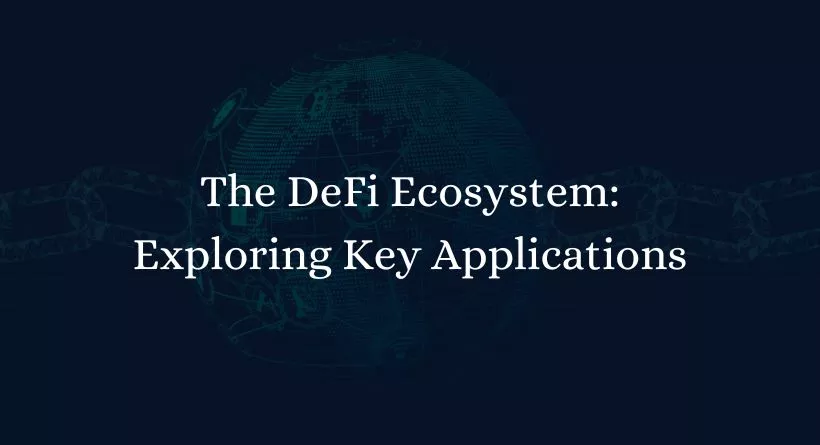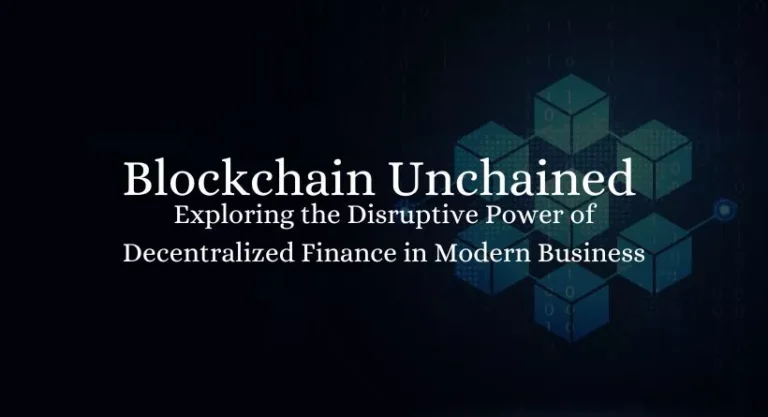In recent years, the emergence of blockchain technology has revolutionized the way we conduct business. One of its most significant innovations is Decentralized Finance (DeFi), a groundbreaking financial ecosystem that operates on a decentralized network, free from traditional intermediaries. This article delves into the disruptive power of DeFi and its potential to reshape the landscape of modern business.
Understanding DeFi: A Paradigm Shift in Finance
Decentralized Finance, or DeFi, is a blockchain-based financial system that enables the creation and facilitation of various financial services and products without the involvement of traditional intermediaries like banks or financial institutions. It operates on smart contracts, self-executing protocols that allow trustless and transparent transactions.
DeFi is not just about digitizing traditional financial services; it goes beyond that, offering a wide range of opportunities, such as decentralized lending, borrowing, trading, insurance, and asset management. This technology empowers individuals with greater control over their finances, without the limitations imposed by centralized entities.
The Advantages of DeFi in Modern Business
2.1 Financial Inclusivity and Accessibility
DeFi enables anyone with an internet connection to participate in financial activities, irrespective of their location or socioeconomic status. This inclusivity empowers the unbanked and underbanked populations, opening doors to new markets and fostering financial inclusion on a global scale.
2.2 Enhanced Security and Transparency
Blockchain’s inherent characteristics ensure that transactions within the DeFi ecosystem are immutable and tamper-proof. As a result, the chances of fraudulent activities are significantly reduced, enhancing security and trust among users. Additionally, the transparency of DeFi protocols allows users to audit transactions independently, fostering a sense of reliability.
2.3 Elimination of Intermediaries
By cutting out intermediaries, DeFi reduces operational costs, making financial services more affordable and efficient. This disintermediation also minimizes the chances of a single point of failure, leading to greater system resilience.
The DeFi Ecosystem: Exploring Key Applications

3.1 Decentralized Exchanges (DEXs)
Decentralized exchanges are platforms that allow users to trade cryptocurrencies directly, eliminating the need for intermediaries. DEXs offer increased privacy and security while promoting the free flow of digital assets.
3.2 Decentralized Lending and Borrowing
DeFi lending platforms enable users to lend their digital assets and earn interest, while borrowers can access funds without the need for credit checks. Smart contracts ensure that loan terms are automatically executed without the intervention of a third party.
3.3 Stablecoins and Decentralized Stable Vaults
Stablecoins are cryptocurrencies pegged to stable assets like fiat currencies or commodities, providing stability in a volatile market. Decentralized stable vaults utilize algorithms to maintain the stability of these stablecoins and expand DeFi’s use cases.
3.4 Decentralized Insurance
DeFi insurance protocols offer a decentralized approach to risk coverage, allowing users to protect their digital assets against potential vulnerabilities in smart contracts or external threats.
Challenges and Future Prospects
4.1 Regulatory Hurdles
The decentralized nature of DeFi has posed challenges for regulators, as traditional financial frameworks do not easily apply to this technology. Striking a balance between innovation and safeguarding consumers remains a critical concern.
4.2 Security Risks
While blockchain is known for its security, DeFi protocols are not immune to vulnerabilities. Smart contract bugs, hacks, and phishing attacks are potential threats that require ongoing efforts to address.
4.3 Scalability
As the DeFi ecosystem grows, scalability becomes a significant issue. The current blockchain infrastructure may struggle to handle the increasing number of transactions, resulting in higher fees and slower processing times.
May Also Like Reading: Unravelling the Strategies of Thriving Entrepreneurs: From Start-up to Success 2023
Conclusion:
Blockchain’s disruptive power in the form of Decentralized Finance (DeFi) is revolutionizing the modern business landscape. By eliminating intermediaries, DeFi empowers individuals with financial inclusivity, accessibility, enhanced security, and transparency. The DeFi ecosystem offers a plethora of applications, including decentralized exchanges, lending, borrowing, stablecoins, and insurance, providing users with greater control over their financial activities.
However, DeFi is not without its challenges. Regulatory hurdles demand a delicate balance between innovation and consumer protection. Security risks, though mitigated by blockchain’s inherent security, remain a concern that requires ongoing efforts to address. Scalability issues need to be tackled as the DeFi ecosystem continues to expand.
Despite these challenges, the potential of DeFi to reshape the financial industry is immense. As the technology evolves and matures, embracing DeFi can lead to a more equitable and efficient financial future, fostering a global economy built on trust, transparency, and decentralized principles.







